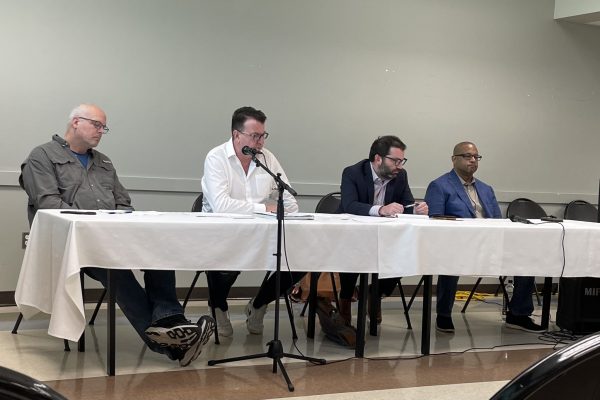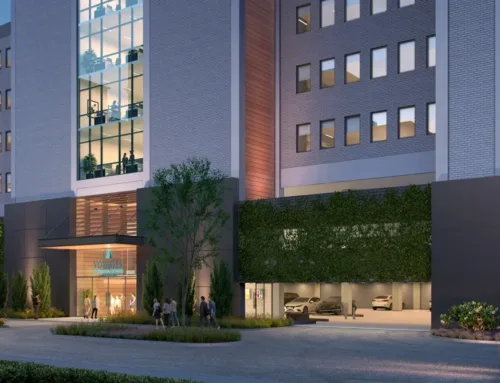
Bill Hall, Ken Montgomery, Kyle Hines and Darren Smith speak to neighbors at a public facility corporation town hall meeting held June 15 at Harry Stone Recreation Center. Photo by Renee Umsted.
During a public meeting intended to teach neighbors about the Dallas Public Facility Corporation, only one project was on neighbors’ minds: The Standard Shoreline.
The office of District 9 City Council member Paula Blackmon hosted two meetings to educate community members about the PFC, which is a tool the City of Dallas and other entities can use to increase the availability of affordable housing. A recording of the first meeting is available here. The second meeting was held June 15 at Harry Stone Recreation Center.
Any housing development that partners with the PFC must have at least 50% of the units set aside for residents who earn at or below 80% of the area median income (AMI). The “affordable” component of The Standard Shoreline, planned for the Shoreline Church site on Garland Road, would be classified as workforce housing, meant to serve police officers, Dallas ISD teachers, firefighters and others earning 60%-80% AMI.
Kyle Hines, a District 9 resident who is the assistant director of Housing and Neighborhood Revitalization at the City of Dallas, says developments approved to participate in the PFC program are generally located in areas with good schools, low crime rates and within close proximity to amenities and transportation.
However, the City doesn’t select specific locations as places for PFC developments. Rather, developers apply to participate in the program with a project and location in mind.
Using a PFC to create housing options is a relatively new tool for Dallas, so there aren’t any existing examples of projects in the city similar to the Shoreline project.
“This is a mechanism developers want to use because it works for them, and it works for the City,” says Bill Hall, a housing consultant on the panel. “If it didn’t work for both, we wouldn’t have people applying for it.”
Developers such as Dallas-based Ojala Holdings, which is proposing the Shoreline project, provide funding for the project and promise to lease at least 50% of units at a below-market rate to residents who qualify. The City of Dallas would own the land, but the developer owns the structure. In return, the City offers the developer a 75-year property tax exemption, which makes the project financially feasible for developers.
The City receives a structuring fee, typically around $250,000, as well as an annual lease payment from the developer that is around 25% of the taxes that would have been paid, increasing by 3% each year.
If the property is sold, the PFC receives 15% of the sale price after all the debt and equity is repaid. Afterward, if the property changes hands again, the PFC receives 2% of the gross sale proceeds. These funds can then be used to invest in more affordable housing or contribute toward the City’s home repair program, for example.
The City can include language in the lease that allows it to send crews to fix maintenance issues and bill the developer if issues aren’t solved in a timely manner.
But the City isn’t the only stakeholder; banks and others invest in these developments.
“All of those people also have investment committees that are just as tough as we are,” Hines says. “And they’re not going to allow them to have a property management company that will risk the value of their assets.”
Other concerns from neighbors are related to parking, and Ken Montgomery, who sits on the PFC Board, says the lease can be written to help the PFC enforce parking requirements.
But the development hasn’t gone before the City Plan Commission, so many questions involving zoning — such as exact height restrictions for the structure — can’t yet be answered.
Montgomery says the expectation is the zoning case will go before the City Plan Commission in August or September, and it will be presented to the City Council by the end of the year.





